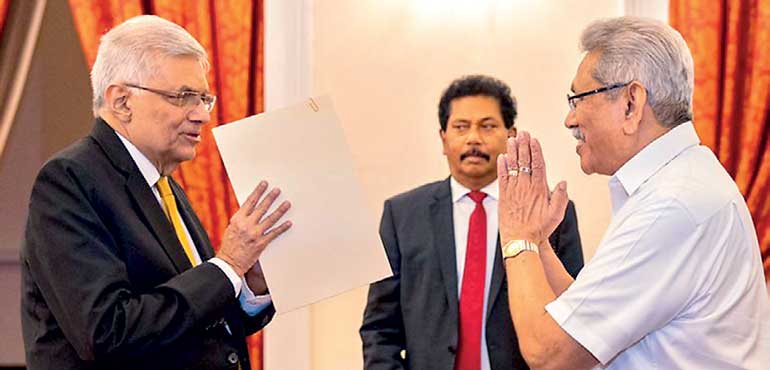Saturday Feb 14, 2026
Saturday Feb 14, 2026
Tuesday, 17 May 2022 02:25 - - {{hitsCtrl.values.hits}}

That political stability is the most urgent prerequisite to start repairing the economy and provide some relief to a battered nation is beyond debate. The Governor of CBSL added his voice to this urgency and warned that he would not hesitate to throw the towel unless that stability is restored without delay. Even the world outside, including the IMF, stressed political stability as precondition for economic assistance and revival. But whether the choice of RW as stopgap prime minister and a new team of around 15 cabinet ministers, all handpicked by the President, would bring that stability is questionable. It is indeed a rocky road to travel for RW.
To start with, RW is a weak leader with a blemished record of trying to please everyone and ending up pleasing nobody. This was clearly proved by the way he led the Yahapalana Government from 2015-19. He ended up splitting his own party, the UNP; led his splinter to a record rout at the elections; lost his own seat; and reappeared in the parliament through the backdoor. More than that, when he was the Yahapalana PM he took no action against the previous Rajapaksa government, which had serious allegations of corruption, mismanagement and war crimes. Instead, he tried to protect that regime so that in case it came back it would show its gratitude to him.
Lo and behold! That was what happened. When Rajapaksas were returned to power in 2019, RW’s central bank bond scam episode was forgotten, and the PCoI report over 2018 Easter bombing, in which RW and MS jointly ignored all intelligence provided to them, was also allowed to rust in Parliament’s archive. Now, with the collapse of that Government amidst a State-sponsored bloody riot and mayhem that allowed its main culprit, Prime Minister Mahinda Rajapaksa, to escape and seek protection inside Trincomalee naval base, President GR, under whose watchful eyes that riot took place, had appointed RW to become a stopgap prime minister with a stopgap cabinet to be appointed soon.
The advertised reason for these appointments was to rebuild the shattered economy and unite a divided nation. However, RW’s name was circulating to become PM long before the resignation of Rajapaksa. The task facing him now is too huge and the odds in RW’s favour are too little.
As a student of that prestigious Royal College in Colombo, as an attorney-at-law, and with an Honorary Doctorate from Australia’s Deakin University, RW commands a better reputation internationally than his predecessor. He is a centre rightist as far as economic philosophy is concerned. Understandably therefore, no sooner was he appointed, the stock market reacted favourably, rupee appreciated marginally and foreign governments, notably US, India, China and Japan were quick to send him congratulatory messages and well wishes.
With the appointment of a Minister of Finance talks with the IMF could also recommence in earnest. In fact, RW was one of the earliest to pressure the Rajapaksa Government to approach IMF for assistance and advice. Yet, his personal reputation, IMF assistance and generosity from friendly nations are not sufficient enough to make the economy revive and grow.
Tough measures are needed, such as an increase in tax revenue without hitting low-income earners, radical reforms to reduce the size and increase efficiency in public service and state enterprises, measures to end rampant corruption and the power of mafias, improving public welfare and ensuring a safety net for the poor and downtrodden. These are urgently needed to restructure an economy that has become moribund and lost its productive capacity over decades. But to accomplish this immense task there needs to be a government that carries the wholehearted support of the people. Being an appointed and anointed PM by a beleaguered president and a few Buddhist monks respectively does not guarantee popular support. The Aragalaya wants GR to go home. Period. Thus, caretaker RW will not have the strength and resolve to undertake the remedial measures mentioned.
Already, three major parties in the opposition, SJB, SLFP, JVP and another 11 independents had refused to accept ministerial positions in the caretaker government, but promised to lend support to meaningful measures to revive the economy. This promise has to be tested. However, there will always be a few parliamentarians who are up for sale to the highest bidder, and one may see them creeping into the new cabinet. Whether these new faces have a clear grasp of the issues mentioned above and the required skill and strategy to tackle them is yet to be seen. Unless fresh calibre is brought from outside the parliament and introduced into the new cabinet, it would be a story of rehashing old ideas from the stock of 225.
The immediate problem facing RW therefore is the future of Aragalaya. Although RW declared support for GotaGoGama, which was also endorsed by the army commander on condition that it remains peaceful, his master GR would wish that to disappear. GotaGoGama’s demand for systemic change includes not only the removal of the 20th Amendment with a 21st to disempower the presidency and send GR home, but also, and more immediately, to bring Rajapaksas to justice regarding allegations of gross mismanagement and financial misdemeanours. This is a tough task. RW would therefore be trying every tactic under his sleeves to weaken Aragalaya’s resolve and to protect the Rajapaksa clan. If his tactic ends in another bloody episode, one could wish goodbye to RW also and his efforts, if any, to repair the economy.
Unless GR’s removal is assured, Parliament regains the powers it lost and fresh elections are held to elect a government with representatives of technocratic calibre, Aragalaya would not lose its momentum. If RW’s anointed government could pave the way for these changes that would be its lasting service to the nation. Will RW rescue the economy or Rajapaksas or both?
(The writer is attached to Murdoch Business School, Murdoch University, Western Australia.)